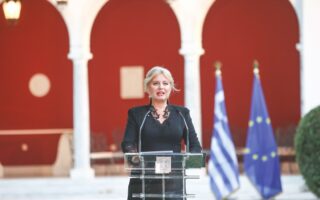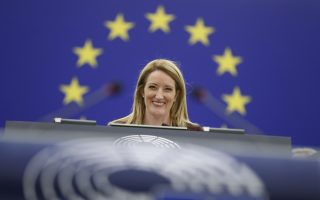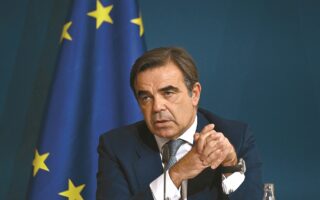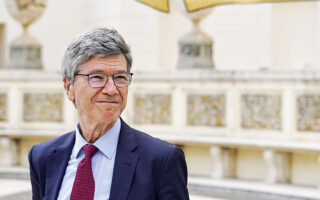‘It is too early to declare the decline of the center’
Former prime minister offers his assessment of what the election of a far-right coalition in Rome means for Italy and Europe
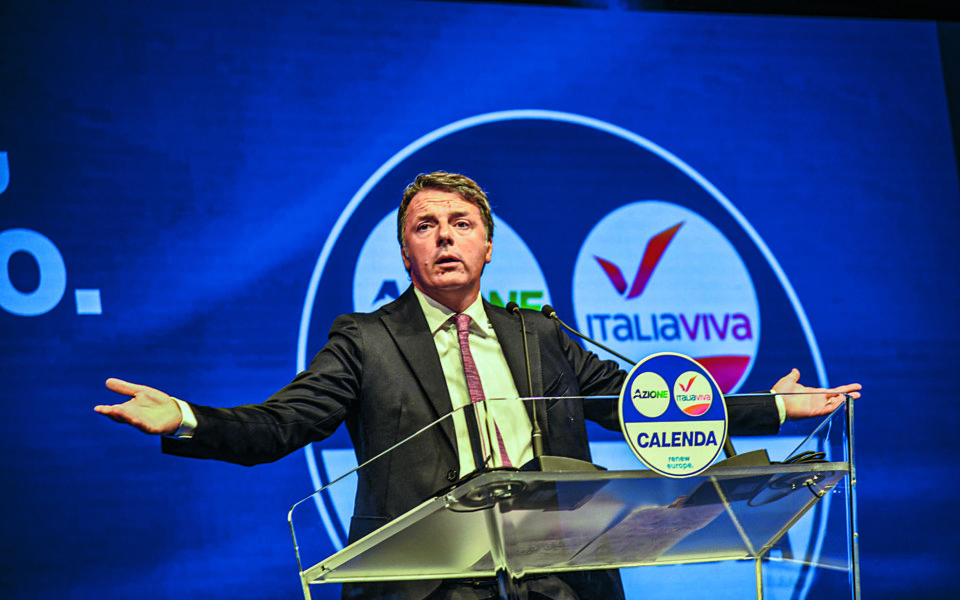
The elections in Italy and the rise of a right-wing coalition under the leadership of Giorgia Meloni sent shockwaves through the heart of the European Union. The center, and especially the center-left, could not reverse the trajectory of its decline.
Kathimerini met up with one of the candidates who was defeated in the recent polls, former prime minister Matteo Renzi, at the Sixth Sustainability Summit for Southeast Europe and the Mediterranean, organized in Athens by Economist Impact.
The recent elections in Italy and the rise of the far right are causing concern in Europe. How do you explain this political phenomenon? Why are the center-left parties losing popularity?
In my view, the approach is a little different. I think there is a new centrism in Europe and that is the [Emmanuel] Macron approach and Tony Blair’s approach. Also, my humble position is that in Europe, traditionally victory was in the center. Now we have some places, and unfortunately also Italy, where we decided to give the power to the far right, but that far right was extreme in the electoral campaign, not in the government. So Giorgia Meloni 10 years ago spoke about the need to cancel the euro and the return to lira. Now she is pro-European and her position for the moment is in the same direction as her predecessor, the prime minister before her. The same happened with the Five Star Movement; they won the elections with a platform against Europe and then they became pro-Europeans. So I think being populist is good in the electoral campaign. It is not so good in the government.
I do not think there is a decline in the center-left. There is a decline of left thinking, like in France and the Socialist Party, and unfortunately also in Italy, because the Democratic Party gave too much power to the Five Star Movement. But I believe there is a great deal of space in the center of the political stage. And I believe that this space will be crucial for a new equilibrium in the European institutions in the European elections of 2024. It is too early to declare the decline of the center.
Many analysts interpret the high rates achieved by right-wing parties as the result of immigration policies adopted by many governments.
‘We have to come back to play an energetic role. That means blocking the idea of Germany having a privileged friendship with Russia and considering Greece and Italy as energy hubs’
Yes, that is included in the far-right’s narrative, but in reality it is a fake problem. I think about Italy, in which births fall by half a million every year. And we have an unbelievable number of people who left Italy to become migrants in Europe and the USA, particularly ones with high-level skills.
I was born in 1975. There were 1 million new babies born that year in Italy. In 2021 we had less than 400,000 births. That is a tragedy because it is not a decline, it is a collapse. And that is the problem. If you think about the number of people who arrive, it’s very small. Italy and France had a dispute – Meloni against Macron – over 247 people [migrants]. So, it is important in the far-right narrative. But I think we have to go back, to examine the real situation, which is clear. We cannot continue the discussion about migration without a big discussion about demographics. At the same time, we have to encourage a different type of immigration. For example, I think our universities have to become a hub for students around the world to stay in Europe and spend their time in Europe and use their brains in Europe.
The Russian invasion of Ukraine triggered chaos in the energy market. Is the EU’s dependence on Russian gas the fault of EU countries?
The mistake is from Russia’s side because Russia decided to invade and is responsible. The invasion canceled everything. If Russia had some reason to claim a lack of implementation of the Minsk agreement, this was voided by the decision to violate the integrity of Ukraine.
I think we missed a lot of opportunities to carry out a dialogue with Russia, in part on the responsibility of Vladimir Putin, and in part on the responsibility of European leaders in the last 20 years. Now, the question is very complicated.
First of all, we have to come back to play an energetic role. That means blocking the idea of Germany having a privileged friendship with Russia, for example through Nord Stream 2, and considering Greece and Italy as energy hubs, and not only as places of the migration problem. Southeast Europe has become more attractive and more interesting than in the past, because we have to discuss pipelines, oil and gas, renewables, and not only the number of migrants. The second point is to try to understand that there is a radical change in the world, a shift in the direction of East and Asia. Therefore, we ask the Europeans, what is our future? Do we continue only with the approach of being spectators between the USA and China? Or can we play a role as protagonists?
Back in 2015, when Greece was in the grips of a prolonged economic crisis, you gave then prime minister Alexis Tsipras a tie as a gift. What was your cooperation with the Greek government like at the time?
We had a positive and less positive relationship with the Greek government, the usual between friends and partners. But I was very strongly supportive of Greece and against Germany in particular on the night of the decision [Greek referendum], in July 2015. And I remember that tragic moment, that hard moment, very well because I was close to Alexis. I spoke with Alexis a few times on that tragic night, and I did everything in my power to save not only Greece but Europe, because Europe without Greece loses not only its roots and cultural identity but also a piece of the future. I am strongly persuaded by that. And I was persuaded when Alexis Tsipras was the prime minister. Now with Kyriakos Mitsotakis [as PM] it is the same approach for me.
We have to consider Greece a pillar of Europe. I remember a discussion about the public debt of Greece and I tried to explain that there is a public debt of Europe to Greece for its history. If we can discuss democracy, philosophy and culture, that is because Greece established that. We may have some a problem with the budget, but we also have a public debt to Greece.
